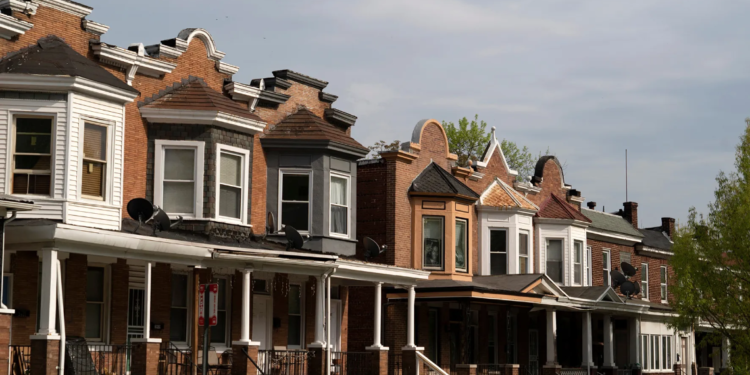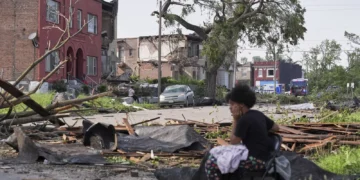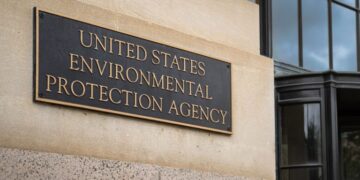Baltimore, Md. | Photo credit: Shutterstock
July 8, 2024 Story by: Editor
Historically, residents of disadvantaged neighborhoods have often viewed revitalization efforts with skepticism. Well-intentioned renewal programs and investor-driven development frequently displaced them from their homes. The challenges faced by these neighborhoods, particularly those with predominantly Black populations, are deeply rooted in racially biased policies such as redlining. A new approach to revitalization, focusing on community-led interventions in the housing market, seeks to turn these challenges into opportunities, fostering larger, stronger, and more inclusive communities.
Hyper-Vacancy and Devaluation: A Cycle of Displacement
Declining markets and unsafe neighborhoods often suffer from hyper-vacancy, characterized by an excessively high number of unoccupied homes. For instance, Baltimore had approximately 15,000 vacant residential properties in 2022, maintaining a 7% to 8% vacancy rate for over a decade. In 2010, legacy cities like Detroit, Baltimore, and Cleveland, which experienced significant population declines due to industrial job losses, also reported high hyper-vacancy rates. In Baltimore, 29.5% of census tracts faced hyper-vacancy in 2010, up from 7.5% in 1990.
The abundance of vacant homes leads to devaluation—where a property’s value is lower than its worth—and displacement, perpetuating disinvestment cycles. A 2018 Brookings study found that homes in predominantly Black neighborhoods nationwide are valued 21% to 23% lower, on average, than similar homes in white neighborhoods with the same socioeconomic demographics.
When devaluation combines with hyper-vacancy, the neighborhood damage worsens. Reduced quality of neighborhood amenities, population flight, social decline, and diminished investment lower property prices, attracting investors and paving the way for gentrification that displaces low-income residents. This occurred in Baltimore’s Middle East neighborhood, where legacy residents were displaced by more affluent newcomers, excluding the original residents from affordable housing in their own neighborhood.
Revitalizing communities can be challenging at a practical level. Properties priced below their worth make it difficult for investors to secure proper financing; the development cost is much higher than the property’s low value. Some investors avoid investing in areas perceived to offer little return. While different from displacement caused by devaluation, this also negatively impacts low-income and legacy residents. Those who remain in declining neighborhoods see their assets lose value and become stranded in a blighted area.
Devaluation is a common factor in both the displacement from gentrification and the asset erosion when investors lack incentives to invest in a community. Investment in people and solutions that facilitate local economic development without displacing legacy residents is crucial.
Community-Led Solutions to Interrupt Devaluation Cycles
Projects like Parity, founded by former financial analyst Bree Jones, aim to achieve these goals. Based in West Baltimore, Parity acquires and rehabilitates abandoned properties by the block, challenging traditional home purchasing approaches. Run and operated by Baltimore residents, Parity addresses the city’s high gentrification rates.
Jones, having witnessed development issues in her hometown of New Rochelle, New York, focused on creating a more inclusive and locally representative development process in Baltimore. This approach helps lower the high costs that make acquiring and redeveloping abandoned buildings difficult for legacy residents.
Parity takes control of the development process, heavily involving neighborhood residents, shifting power structures away from profit-focused, extractive development to community hands. This creates a new avenue for revitalization, allowing community members, otherwise priced out of the development process, to participate.
Similar innovations are occurring in other U.S. cities facing hyper-vacancy and gentrification challenges. The Fitzgerald Revitalization Project in Detroit transforms 400 publicly owned vacant lands and buildings into community assets, including parks and recreation areas. The project emphasizes civic assets like parks, neighborhood centers, and locally owned businesses, with local community members actively guiding redevelopment efforts.
Organizations like The Works in Memphis use a different strategy to combat gentrification, leveraging existing community assets to create economically diverse and robust neighborhoods. In Klondike, a historic Black-majority neighborhood, The Works subsidizes homeownership costs using a shared-equity model. This approach helps keep the neighborhood affordable, developing mixed-income properties that spread the benefits of neighborhood development across income groups. The Works adheres to three “non-negotiables”: zero displacement, permanent affordability, and creating homeowner wealth through rising home values for those who can buy without shared equity.
Hyper-Vacancy and Devaluation: Opportunities for Community Renewal
Addressing devaluation and racism requires policymakers to prioritize fair housing initiatives across income levels, eliminate racial discrimination, and adopt investment strategies that enhance access to investment benefits. By supporting community-led organizations and implementing anti-discrimination measures, governments can mitigate structural racism’s harmful effects and foster vibrant, resilient neighborhoods for all residents.
Hyper-vacancy and devaluation can become opportunities for community-led renewal and empowerment. By reframing these challenges as catalysts for change, systemic barriers can be dismantled, creating more equitable housing markets. Through collaborative efforts and targeted policy interventions, resilient neighborhoods reflecting our communities’ diversity and vibrancy can be built. Investing in these people and places ensures that the American dream is accessible to all. Source: Brookingsrtunities for community-led renewal and empowerment. By reframing these challenges as catalysts for change, systemic barriers can be dismantled, creating more equitable housing markets. Through collaborative efforts and targeted policy interventions, resilient neighborhoods reflecting our communities’ diversity and vibrancy can be built. Investing in these people and places ensures that the American dream is accessible to all. Source: Brookings

















